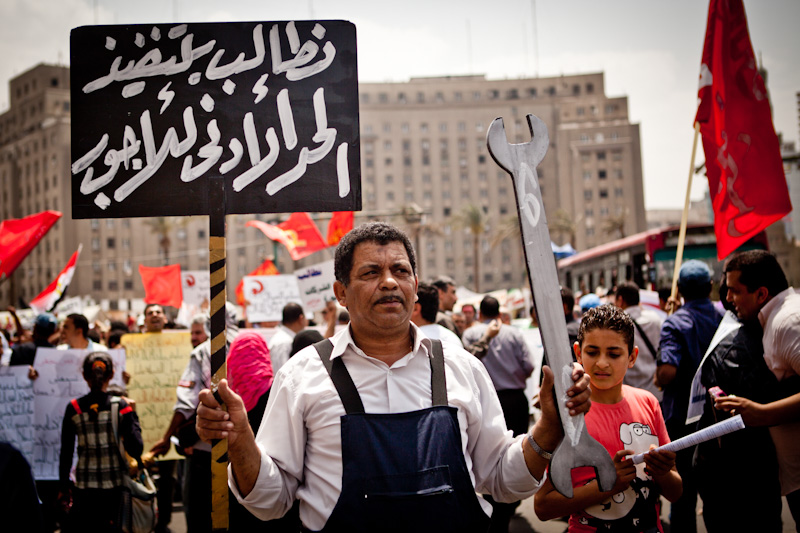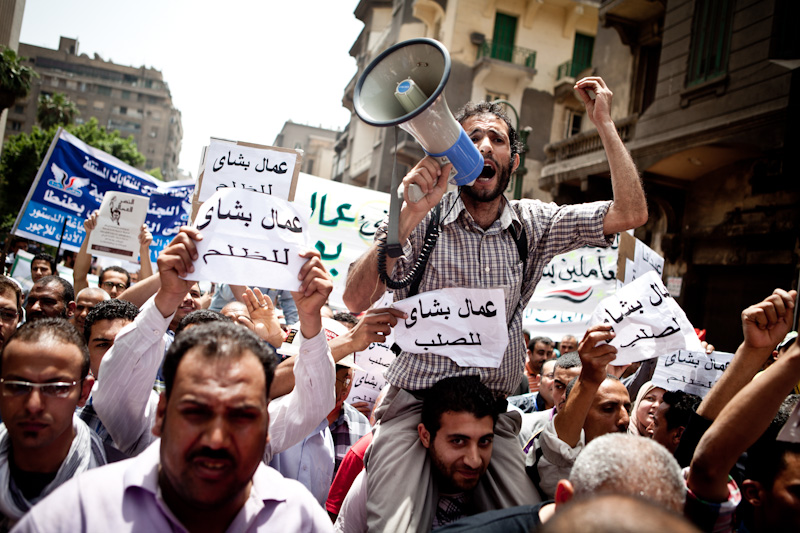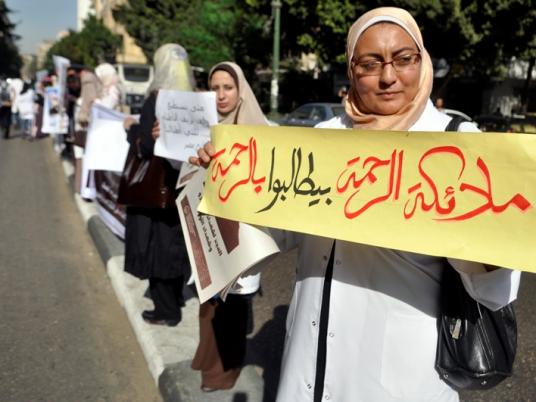Just when everyone thought that the fervor of Egypt’s revolution might be flagging, labor protests and fears of a Mubarak-era comeback following military rulers' announcement they would broaden Emergency Law enforcement are reigniting revolutionary spirit.
Labor strikes have swept the country’s governorates over the past two weeks as hundreds of thousands of public workers and professionals have protested low pay, shoddy public services and unfulfilled government promises for better conditions. But unlike most previous labor efforts, these strikes are marked by both high participation and a developing nationwide coordination.
Doctors have stopped working in all hospital units except emergency care, teachers sent students home and have refused to hold classes since the beginning of school year and bus drivers are camping out in garages, with about a dozen going on hunger strike.
That general strikes in different sectors across the nation occur at the same time and with participation reaching above 50 percent of the workforce and even 100 percent in some governorates is unprecedented in Egypt, said Khaled Ali, director of the Egyptian Center for Economic and Social Rights (ECESR).
“The wave of strikes and workers’ protests that accompanied the downfall of Mubarak and have continued since then are a continuation of a movement that began over 10 years ago,” said Ali.
Unlike previous labor protests in which workers used to ask only for better wages, the current ones have been calling for a general improvement of the service that would benefit both the workers and the people at the receiving end. The discourse stands in clear defiance to SCAF’s repeated calls to end “class-based” protests and strikes as they hamper economic and political progress.
“We are not asking for class-based demands. The Egyptian citizen has the right to find a decent service. The buses we ride are dysfunctional. We are demanding a new bus fleet because when the people pay for a bus and then it stops in the middle of the road, they get upset and fight with us,” said Ali Fattouh, head of the Public Transportation Authority’s independent syndicate in Qalyubiya.
Teachers held up signs and repeated chants such as “The nation’s reform starts with reform of the teacher," and “I don’t want to have to give private lessons again.” Tutored private lessons are an ongoing parallel scheme to public education; many students resort to paying extra fees for better learning that cannot be accommodated in underfunded, overcrowded classrooms.
“We are parents just like we are teachers. We want better education for our children and the government should pay to improve it, not the people who are forced to pay extra money in private lessons for the lack of good education at schools,” said Eman Hafez, a primary school teacher and member of the Egyptian Teachers Union.
Doctors are demanding better security in hospitals and have rejected the minister’s proposal to raise treatment prices, saying they don’t want their rights to come at the expense of patients. They also demanded an increase in healthcare spending from 3 percent to 15 percent of the national budget.
The level of organization within strikes in different governorates and the use of unified demands are setting these protests apart from previous ones, which were often marked by geographically and institutionally specific grievances.
When organizing the strikes, representatives from different independent associations and syndicates across the country first met to agree on a list of demands and set a plan of action. They maintained communication through a Facebook group that made it easier and faster to exchange ideas and think about the next steps, said Hafez.
Hafez attributed the reinvigorated strikes to the transition government's resistance to changing the old regime’s policies.
“After the revolution, we had high hopes that things would change because social justice was on top of the uprising’s demands. But the government didn’t make any positive steps in this direction. It didn’t even apply its promised LE700 minimum wage and didn’t set a maximum wage,” said Hafez.
Joel Benin, professor of Middle East history at Stanford University and author of the book "The Struggle for Worker Rights in Egypt," said the SCAF is trying to keep as much of the old regime in tact as possible.
“The workers’ strike wave shows that they reject this. They want a democratic voice in their workplaces. They want an economic policy that ensures that working people have a decent standard of living – enough food to eat and clothes to wear, enough for decent housing and healthcare, and education for their children. This is not too much to ask. A democratic society should provide these things for its citizens.”
According to Benin, while most of the initiative for strikes and protests is coming from individual factories and workplaces, one major factor in the success of this movement is the national leadership and coordination provided by the Egyptian Federation of Independent Trade Unions, which was formed in January, and other institutions such as the Center for Trade Union and Workers Services and the ECESR.
While not overtly a political movement, the ongoing labor activity defies both the law criminalizing strikes and protests and the Emergency Law. Although some protesters have received detention threats, the ruling Supreme Council of the Armed Forces seems unwilling to impose a complete clampdown on the thriving labor movement.
“We don’t care about their laws. Striking is a legitimate right for all of us citizens as long as we are peaceful and not harming any person or public facility. The revolution’s wheel will not turn backward,” said Hafez.
Only a few socialist political parties have expressed their support for the labor strikes while the majority have remained silent.
“Political forces are busy with their narrow political battles and as a result they will lose the street’s support,” said Ali.
Ali added that the role of political parties must not go beyond providing support to the labor demands because they will never be an alternative to the labor movement.
“It’s the workers' fight and they have to do it on their own," Ali said.




